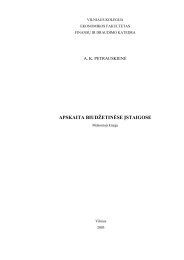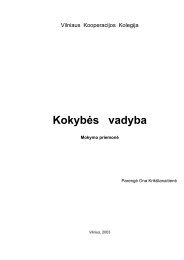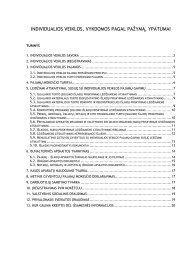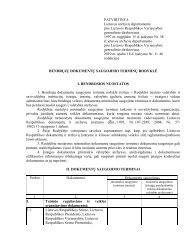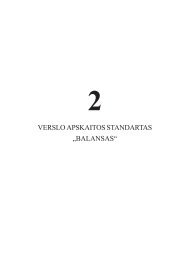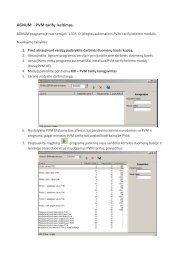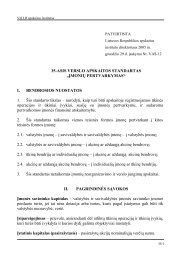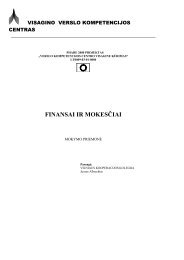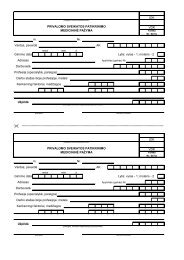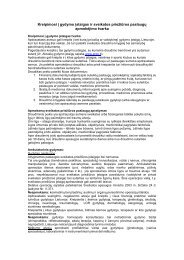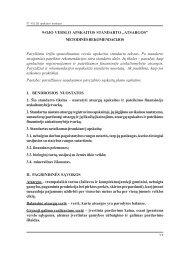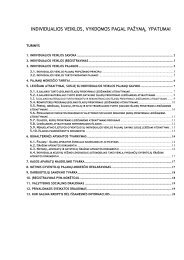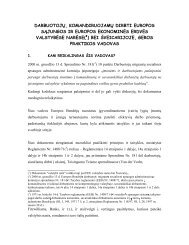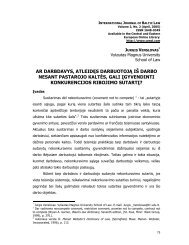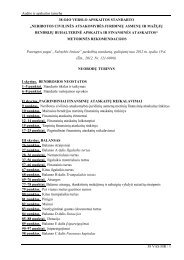Tiesioginės užsienio investicijos Lietuvoje Foreign Direct Investment ...
Tiesioginės užsienio investicijos Lietuvoje Foreign Direct Investment ...
Tiesioginės užsienio investicijos Lietuvoje Foreign Direct Investment ...
You also want an ePaper? Increase the reach of your titles
YUMPU automatically turns print PDFs into web optimized ePapers that Google loves.
PRATARMĖ<br />
TIESIOGINĖS UŽSIENIO INVESTICIJOS LIETUVOJE<br />
FOREIGN DIRECT INVESTMENT IN LITHUANIA<br />
FOREWORD<br />
<strong>Tiesioginės</strong> <strong>užsienio</strong> <strong>investicijos</strong> (TUI) –<br />
iki tam tikros datos sukauptos tiesioginės<br />
<strong>užsienio</strong> <strong>investicijos</strong>, rodančios tikrąją<br />
laikotarpio pradžios tiesioginių <strong>užsienio</strong><br />
investicijų būklę.<br />
Tiesioginė <strong>užsienio</strong> investicija yra<br />
laikoma tokia investicija, kurios pagrindu<br />
susiformuoja ilgalaikiai ekonominiai<br />
finansiniai santykiai ir interesai tarp<br />
tiesioginio <strong>užsienio</strong> investuotojo ir<br />
tiesioginio investavimo įmonės. EBPO<br />
rekomendacijose 10 procentų balso teisių<br />
pripažįstama kaip žemutinė riba, nuo kurios<br />
tiesioginis <strong>užsienio</strong> investuotojas turi<br />
galimybę dalyvauti valdant tiesioginio<br />
investavimo įmonę. Užsienio investicija,<br />
mažesnė nei 10 procentų balso teisių,<br />
priskiriama ne tiesioginėms investicijoms, o<br />
investicijų portfeliui.<br />
Tiesioginėms <strong>užsienio</strong> investicijoms<br />
priskiriamas ne tik pirminis kapitalo investavimas,<br />
bet ir visos vėlesnės ekonominės<br />
operacijos tarp investuotojo ir tiesioginio<br />
investavimo įmonės. Tiesiogines <strong>užsienio</strong><br />
investicijas sudaro:<br />
– tiesioginiam <strong>užsienio</strong> investuotojui<br />
tenkanti įmonės nuosavo kapitalo dalis<br />
(atsižvelgiant į turimus balsus, t. y. į turimą<br />
įmonės įstatinio kapitalo dalį);<br />
– re<strong>investicijos</strong> – tiesiogiai <strong>užsienio</strong><br />
investuotojui priklausanti pelno (nuostolio)<br />
dalis, ataskaitiniu laikotarpiu nepaskirstyta<br />
dividendų forma ir likusi įmonėje;<br />
– tiesioginio <strong>užsienio</strong> investuotojo<br />
investavimo įmonei suteiktos ilgalaikės ir<br />
trumpalaikės paskolos. Paskolos, gautos<br />
Lietuvos valstybės vardu ir su valstybės<br />
garantija, nėra tiesioginės <strong>užsienio</strong><br />
<strong>investicijos</strong>;<br />
– kitas įmonės kapitalas – tiesioginio<br />
<strong>užsienio</strong> investuotojo ir tiesioginio investavimo<br />
įmonės prekybos skolos, priskaičiuoti,<br />
bet neišmokėti dividendai, privilegijuotos<br />
akcijos, nesuteikančios teisių į turtą<br />
likviduojant įmonę, palūkanos už paskolas<br />
ir t. t.<br />
<strong>Foreign</strong> direct investment (FDI)<br />
presents foreign direct investment<br />
positions on a specific date that reflect the<br />
real situation of the FDI at the beginning of<br />
the period.<br />
<strong>Foreign</strong> direct investment is such an<br />
investment on the basis of which long-term<br />
economic financial relations and interests<br />
are built between a foreign direct investor<br />
and a direct investment company.<br />
Recommendations of the OECD recognise<br />
10 per cent of voting rights as the lowest<br />
limit under which a foreign direct investor<br />
has a possibility to participate in the<br />
management of a direct investment<br />
company. <strong>Foreign</strong> investment lower than<br />
10 per cent of voting rights is attributed to<br />
investment portfolio instead of direct<br />
investment.<br />
Not only the primary capital investment<br />
is attributed the FDI, but also all later<br />
operations between the investor and the<br />
direct investment company. FDI consist of<br />
the following:<br />
– part of the share capital of the foreign<br />
direct investor (with reference to the<br />
acquired voting rights, i.e. the acquired<br />
share of the company’s authorized capital);<br />
– reinvested earnings consist of the<br />
direct investors’ share (in portion to direct<br />
equity participation) of earnings that was<br />
not distributed to him in the form of<br />
dividends during the period under review<br />
and remained in the company;<br />
– long-term and short-term loans<br />
extended by the foreign direct investor to<br />
the investment company. Loans received<br />
on behalf of the State and under the<br />
Government guarantee are not considered<br />
to be FDI;<br />
– other capital means liabilities of<br />
foreign direct investors and investment<br />
companies such as trade debts, deferred<br />
dividends, preferred shares that do not<br />
guarantee rights to the assets in the event<br />
the company is liquidated, loan interest,<br />
etc.<br />
5



